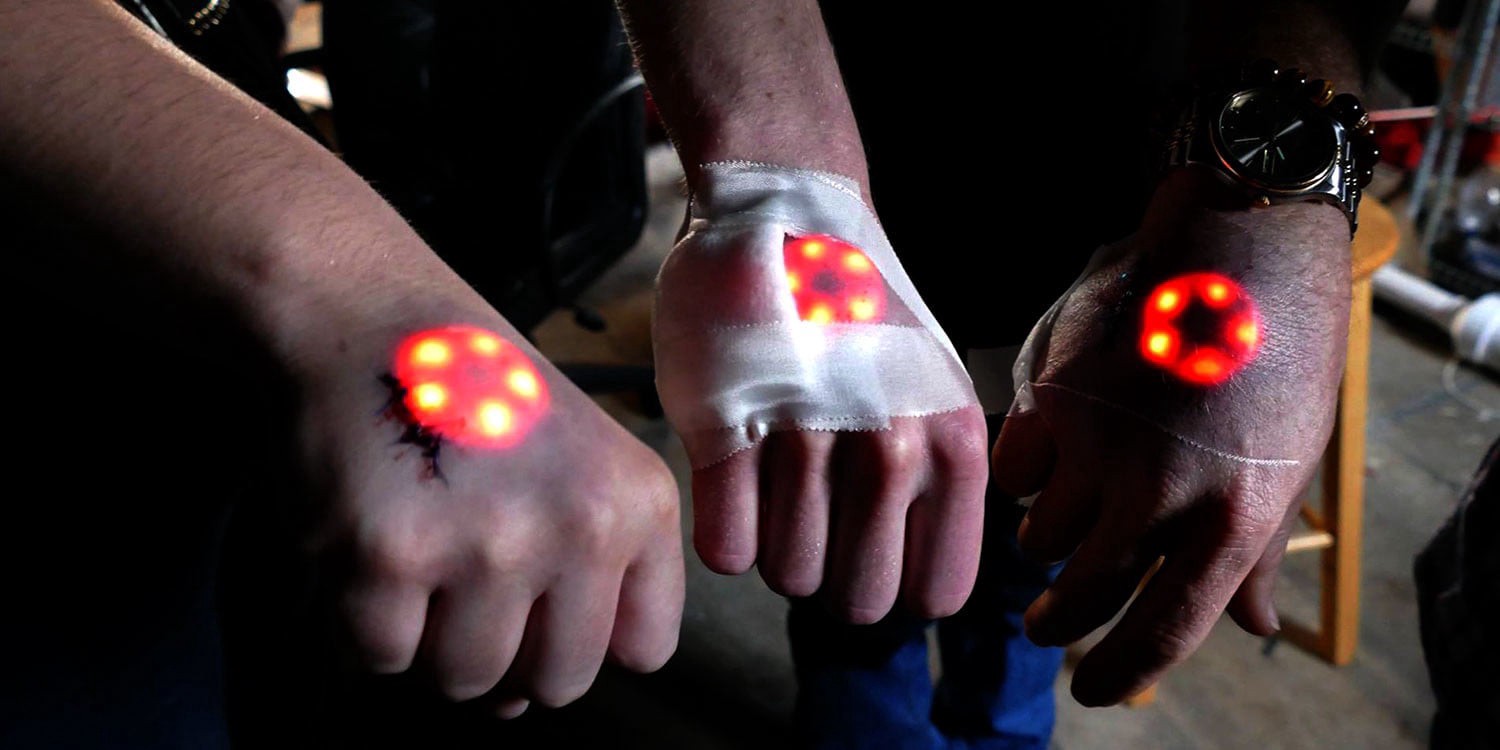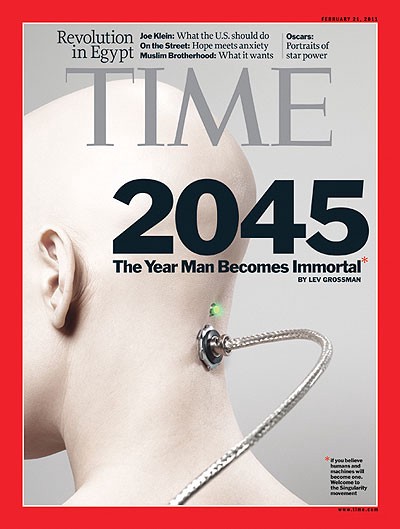Why am I afraid of becoming a "pumped man"
- Transfer
Have you ever heard of augmented human?
The area of human improvement (sometimes referred to as "Man 2.0") is closely engaged in the creation of cognitive and physical modifications as an integral part of the human body.

By human improvement is usually understood the use of technologies that increase the productivity and functionality of a person, or in any way become part of the human body.
The perfection of our nature may seem science fiction, but attempts to improve humanity actually began thousands of years ago.Every day we refine ourselves through special exercises, be it exercise or taking means to improve our performance, such as caffeine. However, the means by which we improve our nature are developing at a very fast pace and becoming much better.
Human-enhancing technologies may be perceived as an important component of our progress or as a cause for increasing concern.
Human Variability
Many biomedical procedures attempt to restore something that is considered lost, say, the ability to move, hearing, or sight.
Many futurists claim that our devices, like our smartphones or any devices that you can wear on the Internet, are already a continuation of the cortex of our brain and in many respects an abstract form of improvement.
Just think that the phone you are wearing is an extension of your brain.
In addition, worn devices and computers are already commercially available, and those who play sports use them to improve results.
But thanks to recent scientific developments in areas such as biotechnology, information technology and nanotechnology, humanity can be on the verge of a revolution of improvement.In the next two decades, people can get the opportunity to change themselves in ways that still existed primarily in the minds of science fiction writers.
Many refer to the human body as an aging technology that needs serious work.
From healing to improving people ...
The impetus for a new era of "pumped people" can serve as continuing attempts to help people with disabilities and heal the sick. In fact, science is already far advanced in new regenerative technologies that could, in theory, prepare the ground for human improvement.
Some people fear that the appearance of “pumping” may lead to an arms race, which threatens to leave behind those who choose not to be “pumped”.
“Pumping” should be considered not so much as a solution to the problem, but as a tool that you can use to develop yourself in new directions.

So where do all these new technologies lead humanity? Here's how to look ...
Influential futurists, such as Ray Kurzweil, believe that we are on the verge of an era when people will be able to direct their own evolution. And yet, even some transhumanists who admire the work of Kurzweil do not fully share his belief that we will soon live completely virtual lives.
“I do not share Ray’s point of view that we will all be disembodied,” says [Natasha] Vita-Mor, who, together with her husband, philosopher Max More, helped found the transhumanism movement in the United States. “We will always have a body, even if that body changes.”
However, devices and drugs that improve our athletic performance may raise the issue of their legitimacy.
Will we be happier by being pumped?
What is happiness?
The founder of TechEmergence Dan Faggella believes that these changes will be associated with the expansion of our consciousness. The desire to be smarter and stronger very quickly give way to the pursuit of a new kind of happiness. “Over the past 200 years, technology has made us like gods ... and yet today people are about as happy as they were before," he says. - "Therefore, I am convinced that by becoming super-Einsteins, we will not become happier ... first of all we use improvement to embody our needs and desires, and not just become more powerful."
In the end, we have to wonder what happiness is. Are there boundaries of happiness? I really like the definition given by Don Draper: “What is happiness ? This is the moment before you need more.happiness . I doubt that becoming "pumped" will give us infinitely happiness.
Rich and poor
What about social strata?
One can imagine that the rich and powerful will gain access to new, costly improvement procedures long before the middle class and the poor, and then use these advantages to widen the already deep gap between the rich and the poor.
Our political system is based on the empirical fact of natural human equality. We are very different as individuals and culturally, but we share a common humanity. Some may argue that this is one of the last bricks of our society ... our common impotence before death.
I am curious whether we are on the verge of creating an even more unjust society. And indeed, it can become even harder to climb the social ladder if we add discrimination on physical productivity ...
Improving a person in popular culture
We are already prepared to recognize the "pumping" of a person?
The idea of going beyond physical capabilities is not new to our popular culture. In fact, the ancient Greeks talked about Prometheus, who stole fire from the gods, and Daedalus, who made wings for himself and his son Icarus. Moreover, at the beginning of the Book of Genesis, Scripture depicts a successful case of human improvement, when Adam and Eve eat the fruit of the tree of the knowledge of good and evil, because the Serpent told them that this would make them "like God."
Recently, I noticed an increased number of movies / video games that use the idea of “human leveling”. Some contribute to their promotion, while others emphasize the negative consequences that it brings to us.
Can we view this large-scale wave of “human pumping” in culture as the preparation of our mind for its recognition?

The political dimension
Should there be any ethical and legal restrictions on technologies that improve people?
One thing is for sure, at the moment there is universal equality, because we are all human beings.But all these changes, as soon as we start giving substantially new abilities to some people, can create problems. I think at some point it will inevitably be what the improved people will see in the undeveloped non-populations. While most Americans agree that expanding functionality can improve the quality of life of individuals, two thirds are concerned about the negative consequences for society. People who deny these technologies for religious, philosophical, or moral reasons risk not only becoming themselves, but also making their children and their children a part of the inevitable social bottom .
In this regard, will governments be forced to enact special laws relating to the prevention of further discrimination? How should we spread these gene enhancements to the global population?
Perhaps you would prefer to remain the kind of person you are now. Or perhaps you would like to have the option of simply updating with a brain implant, why not do it step by step, if you can. And finally, choose the most extreme option and just get rid of your "weak" human body, replacing it with a robotic one.
Will we have a choice at all?
What happens if the AI, which will inevitably develop, will acquire elements of consciousness and become a conscious, autonomous, and to a great extent superior form of life, which will replace us. Most likely people will simply die out. At best, we can be kept for pets, but in this case, sooner or later, we will inevitably disappear.

My opinion is that, as humans, we need to be careful about how we intend to use technology. They can help us, but also destroy the human in us ...
About the author. Alexandre Gonfalonieri writes in her blog about the use of artificial intelligence in everyday life and solving immediate problems. Translation of another article by this author
Explanation of the translator
Я долго искала подходящий перевод термина «augmented human», так как устоявшегося перевода в русском языке еще нет. Вариант Википедии c глаголом «улучшать» кажется недостаточно передающим смысл. Лучше мы станем или нет, это еще большой вопрос. Усовершенствованный — неплохой вариант, но чересчур длинный. Хотелось найти какой-то аналог, подходящий по смыслу и содержанию действия. И подумалось о старом автомобиле, в который ставят двигатель помощнее, тонируют окна и тому подобное. Эдакая «тачка на прокачку». И мне показалось это очень близким к тому, что имеется в виду, только в отношении человека. К тому же, мы говорим, к примеру, что прокачиваем какие-то свои навыки и умения. Так и родился «прокачанный человек». Пока что в кавычках.
The area of human improvement (sometimes referred to as "Man 2.0") is closely engaged in the creation of cognitive and physical modifications as an integral part of the human body.

By human improvement is usually understood the use of technologies that increase the productivity and functionality of a person, or in any way become part of the human body.
The perfection of our nature may seem science fiction, but attempts to improve humanity actually began thousands of years ago.Every day we refine ourselves through special exercises, be it exercise or taking means to improve our performance, such as caffeine. However, the means by which we improve our nature are developing at a very fast pace and becoming much better.
Human-enhancing technologies may be perceived as an important component of our progress or as a cause for increasing concern.
Human Variability
Many biomedical procedures attempt to restore something that is considered lost, say, the ability to move, hearing, or sight.
Many futurists claim that our devices, like our smartphones or any devices that you can wear on the Internet, are already a continuation of the cortex of our brain and in many respects an abstract form of improvement.
Just think that the phone you are wearing is an extension of your brain.
In addition, worn devices and computers are already commercially available, and those who play sports use them to improve results.
But thanks to recent scientific developments in areas such as biotechnology, information technology and nanotechnology, humanity can be on the verge of a revolution of improvement.In the next two decades, people can get the opportunity to change themselves in ways that still existed primarily in the minds of science fiction writers.
Many refer to the human body as an aging technology that needs serious work.
From healing to improving people ...
The impetus for a new era of "pumped people" can serve as continuing attempts to help people with disabilities and heal the sick. In fact, science is already far advanced in new regenerative technologies that could, in theory, prepare the ground for human improvement.
Some people fear that the appearance of “pumping” may lead to an arms race, which threatens to leave behind those who choose not to be “pumped”.
“Pumping” should be considered not so much as a solution to the problem, but as a tool that you can use to develop yourself in new directions.

So where do all these new technologies lead humanity? Here's how to look ...
Influential futurists, such as Ray Kurzweil, believe that we are on the verge of an era when people will be able to direct their own evolution. And yet, even some transhumanists who admire the work of Kurzweil do not fully share his belief that we will soon live completely virtual lives.
“I do not share Ray’s point of view that we will all be disembodied,” says [Natasha] Vita-Mor, who, together with her husband, philosopher Max More, helped found the transhumanism movement in the United States. “We will always have a body, even if that body changes.”
However, devices and drugs that improve our athletic performance may raise the issue of their legitimacy.
Will we be happier by being pumped?
What is happiness?
The founder of TechEmergence Dan Faggella believes that these changes will be associated with the expansion of our consciousness. The desire to be smarter and stronger very quickly give way to the pursuit of a new kind of happiness. “Over the past 200 years, technology has made us like gods ... and yet today people are about as happy as they were before," he says. - "Therefore, I am convinced that by becoming super-Einsteins, we will not become happier ... first of all we use improvement to embody our needs and desires, and not just become more powerful."
In the end, we have to wonder what happiness is. Are there boundaries of happiness? I really like the definition given by Don Draper: “What is happiness ? This is the moment before you need more.happiness . I doubt that becoming "pumped" will give us infinitely happiness.
Rich and poor
What about social strata?
One can imagine that the rich and powerful will gain access to new, costly improvement procedures long before the middle class and the poor, and then use these advantages to widen the already deep gap between the rich and the poor.
Our political system is based on the empirical fact of natural human equality. We are very different as individuals and culturally, but we share a common humanity. Some may argue that this is one of the last bricks of our society ... our common impotence before death.
I am curious whether we are on the verge of creating an even more unjust society. And indeed, it can become even harder to climb the social ladder if we add discrimination on physical productivity ...
Improving a person in popular culture
We are already prepared to recognize the "pumping" of a person?
The idea of going beyond physical capabilities is not new to our popular culture. In fact, the ancient Greeks talked about Prometheus, who stole fire from the gods, and Daedalus, who made wings for himself and his son Icarus. Moreover, at the beginning of the Book of Genesis, Scripture depicts a successful case of human improvement, when Adam and Eve eat the fruit of the tree of the knowledge of good and evil, because the Serpent told them that this would make them "like God."
Recently, I noticed an increased number of movies / video games that use the idea of “human leveling”. Some contribute to their promotion, while others emphasize the negative consequences that it brings to us.
Can we view this large-scale wave of “human pumping” in culture as the preparation of our mind for its recognition?

The political dimension
Should there be any ethical and legal restrictions on technologies that improve people?
One thing is for sure, at the moment there is universal equality, because we are all human beings.But all these changes, as soon as we start giving substantially new abilities to some people, can create problems. I think at some point it will inevitably be what the improved people will see in the undeveloped non-populations. While most Americans agree that expanding functionality can improve the quality of life of individuals, two thirds are concerned about the negative consequences for society. People who deny these technologies for religious, philosophical, or moral reasons risk not only becoming themselves, but also making their children and their children a part of the inevitable social bottom .
In this regard, will governments be forced to enact special laws relating to the prevention of further discrimination? How should we spread these gene enhancements to the global population?
Perhaps you would prefer to remain the kind of person you are now. Or perhaps you would like to have the option of simply updating with a brain implant, why not do it step by step, if you can. And finally, choose the most extreme option and just get rid of your "weak" human body, replacing it with a robotic one.
Will we have a choice at all?
What happens if the AI, which will inevitably develop, will acquire elements of consciousness and become a conscious, autonomous, and to a great extent superior form of life, which will replace us. Most likely people will simply die out. At best, we can be kept for pets, but in this case, sooner or later, we will inevitably disappear.

My opinion is that, as humans, we need to be careful about how we intend to use technology. They can help us, but also destroy the human in us ...
About the author. Alexandre Gonfalonieri writes in her blog about the use of artificial intelligence in everyday life and solving immediate problems. Translation of another article by this author
Only registered users can participate in the survey. Sign in , please.
